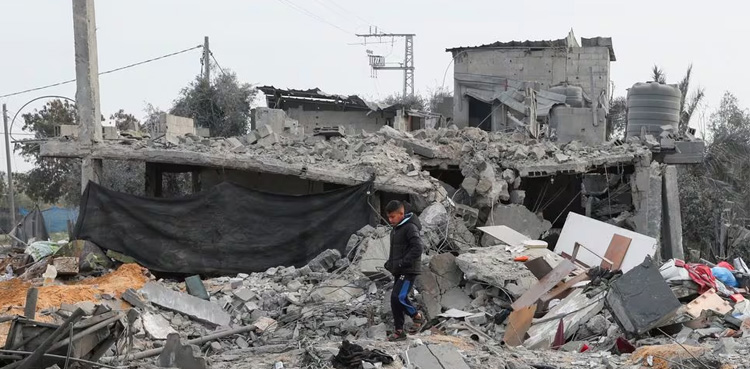
A new ceasefire between Israel and Hamas could start as soon as Monday, US President Joe Biden said, in a deal that could include the exchange of dozens of hostages held in Gaza for several hundred Palestinian detainees.
In a protracted bid to bring about a truce, Egypt, Qatar, the United States, France and others have acted as go-betweens for Israel and Hamas, with negotiations ongoing.
They are seeking a six-week halt to the fighting and the release of Israeli hostages held in Gaza since Hamas’s October 7 attack on southern Israel sparked the war.
A deal could include the release of several hundred Palestinian detainees held by Israel, media reports suggest.
“My hope is by next Monday we’ll have a ceasefire,” said Biden on Monday, when asked when an agreement could start, adding that “we’re close, we’re not done yet”.
An unnamed Israeli official told news site Ynet the “direction is positive”.
Qatar’s Emir Sheikh Tamim bin Hamad Al-Thani — whose country hosts Hamas leaders and helped broker a one-week truce in November — is due in Paris this week, according to the French presidency.
But Israeli Prime Minister Benjamin Netanyahu has stressed any truce deal would delay, not prevent, a ground invasion of Rafah in the far south of the Gaza Strip, which he said was necessary to achieve “total victory” over Hamas.
With Israeli ground troops operating in every other major urban area of the Gaza Strip nearly five months into the war, an estimated 1.4 million Palestinian civilians have sought shelter in Rafah.
Netanyahu’s office on Monday said the military had shown Israel’s war cabinet its plan for evacuating civilians from Rafah, but no details have been released on where those displaced people could go.
‘Final nail in coffin’
The United Nations has repeatedly warned against any ground assault of Rafah, and on Monday Secretary-General Antonio Guterres warned that an assault would “put the final nail in the coffin” of aid operations.
Rafah serves as a crucial entry point for desperately needed aid via neighbouring Egypt, which Guterres said makes it “the core of the humanitarian aid operation” for the Gaza Strip where Israel has been fighting Hamas militants for nearly five months.
Guterres said “nothing can justify Hamas’s deliberate killing, injuring, torturing and kidnapping of civilians” and “nothing justifies the collective punishment of the Palestinian people”.
Ahead of any ground assault, Rafah has not been spared from Israel’s campaign of strikes.
Displaced Gazan Sharif Muammar told AFP his son’s body had been pulled from the rubble after a strike on the city.
“There was no one here — only children,” he said, in tears.
Israel’s military campaign has killed at least 29,782 people in Gaza, mostly women and children, according to the Hamas-ruled territory’s health ministry.
The Hamas attack that triggered the war resulted in the deaths of around 1,160 people in Israel, mostly civilians, according to an AFP tally based on official figures.
Militants also took about 250 Israeli and foreign hostages, 130 of whom remain in Gaza including 31 presumed dead, according to Israel.
Netanyahu has faced increasing public pressure over the fate of hostages still held in Gaza, and from a resurgent anti-government protest movement.
In Israel, municipal elections twice delayed by the fighting will be held Tuesday in a poll which could gauge the public mood nearly five months into Israel’s war against Hamas.
Starving Gazans
In Gaza’s north, desperate Palestinians have scavenged for food as most aid trucks have been halted, with many people eating animal fodder and even leaves.
“We have no flour or anything. We are experiencing famine,” lamented Umm Tahseini al-Masry, who was displaced and now in Jabalia refugee camp, north of Gaza City.
“This is not a life.”
The Jordanian army said it carried out a series of humanitarian aid drops, while Amnesty International and Human Rights Watch (HRW) accused Israel of further limiting aid.
The main UN aid agency for Palestinians, UNRWA, said humanitarian assistance entering Gaza has halved in February from the previous month.
“The Israeli government is starving” Gaza’s 2.4 million Palestinians, said Omar Shakir, HRW’s Israel and Palestine director.
And in a political shock Monday, Palestinian president Mahmud Abbas accepted the resignation of prime minister Mohammad Shtayyeh’s government in the Israeli-occupied West Bank.
A presidential decree said the government will stay on in an interim capacity until a new one is formed.
Israel’s top ally Washington and other powers discussing a post-war Gaza have called for a reformed Palestinian Authority to take charge of both the West Bank and Gaza, which has been ruled by Hamas since 2007.
from ARY NEWS https://ift.tt/LIuYyNb
via IFTTT

0 Comments